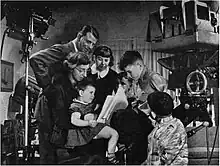Judith Crawley and family | |
|---|---|
 Judith Crawley and family, c. 1950 | |
| Born | April 12, 1914 |
| Died | September 16, 1986 (aged 72) Ottawa, Ontario, Canada |
| Nationality | Canadian |
| Other names |
|
| Alma mater | McGill University |
| Occupation | Filmmaker |
| Known for | Filmmaking |
| Spouse | Frank Radford "Budge" Crawley |
| Children |
|
| Awards | Genie Award for Outstanding Contributions to the Canadian Film Industry |
Judith Rosemary (Sparks) Crawley (April 21, 1914 – September 16, 1986) was a Canadian film producer, cinematographer, director, and screenwriter.[1] She and her husband Frank Radford "Budge" Crawley co-founded the production company Crawley Films in 1939.[2]
Crawley is best known for writing the Academy Award-winning documentary The Man Who Skied Down Everest. She is considered to be the first Canadian female filmmaker, and is recognized as being a pioneer for women who work in the film industry.[3]
Early life
Judith "Judy" Sparks was born in Ottawa, Ontario to Roderick Percy Sparks, a prominent tariff counsel and Rheba (Fraser) Sparks. She studied at the Ottawa Ladies' College, and later studying English and economics from 1933 to 1936, graduated from McGill University, having earned a Bachelor of Arts.
After her marriage to her next door neighbour, "Budge" Crawley, on October 1, 1938, Crawley became interested in filmmaking.[4]
Filmmaking career
Crawley wrote the script and edited Île d'Orléans (1938), the first film she worked on with her husband.[2] Shot during their honeymoon, the film won the Hiram Percy Maxim Award from the Royal Canadian Geographical Society for Best Amateur Film in 1939, making their collaboration the first Canadian film to receive this type of recognition.[5]
Crawley and her husband founded Crawley Films in 1939.[2] As her family grew, Crawley became increasingly interested how to properly raise children. In 1947, she wrote, directed and starred in the educational childcare short film Know Your Baby. Despite its financial failure upon release, the film became immensely popular with audiences, and prompted two follow-up series commissioned by McGraw Hill.[2][Note 1]
From 1941 to 1944, after being hired by renewed Scottish documentary filmmaker John Grierson, Crawley became a freelance cinematographer, screenwriter, editor and director for the National Film Board of Canada (NFB), often working with her husband.[6] During her time at the NFB, Crawley directed Four New Apple Dishes, the first NFB film to be directed by a woman.[3]
As an independent filmmaker on contract to the NFB, the Crawley's The Loon's Necklace (1950) "remains in the national collective unconscious of generations of Canadians.[7]
In 1957, Crawley and her husband were given a joint Canadian Film Award.[5]
After 1961, Crawley elected to focus on producing and writing rather than directing.[8] As a result, Crawley wrote the script for The Man Who Skied Down Everest, which in 1975 won the Academy Award for Best Documentary Feature. This film was the first Canadian-made production to take home the Academy Award for Best Documentary .[2]
After separating from her husband in 1965, Crawley founded another film production company with two of her children, Michal and Jennifer.[9]
From 1979 to 1982, Crawley was the president of the Canadian Film Institute.[2]
In 1986, Crawley and her husband received a joint Special Achievement Genie Award for their continued work in the Canadian film industry.[2]
Death
On September 16, 1986, Crawley died from respiratory disease.[2]
Partial filmography
| Year | Title | Credited As |
|---|---|---|
| 1938 | Île d'Orleans | Writer, Editor |
| 1939 | A Study of Spring Wild Flowers | Director |
| 1940 | Four New Apple Dishes | Director |
| 1941 | Ottawa on the River | Director |
| 1941 | Who Sheds His Blood | Director, Writer |
| 1943 | Terre de nos aieüx (National Film Board) | Cinematograher |
| 1947 | Know Your Baby | Director |
| 1948 | Holiday Island | Director |
| 1948 | Why Won't Tommy Eat? | Director |
| 1949 | He Acts His Age | Director |
| 1951 | The Terrible Twos and the Trusting Threes | Director |
| 1953 | The Frustrating Fours and the Fascinating Fives | Director |
| 1954 | Food for Freddy | Director |
| 1954 | From Sociable Six to Noisy Nine | Director |
| 1958 | Legend of the Raven | Producer |
| 1975 | The Man Who Skied Down Everest | Writer |
| 1985 | The Start of a Lifetime | Director |
References
Notes
Citations
- ↑ Wise 2015, p. 1954.
- 1 2 3 4 5 6 7 8 9 "Judith (Rosemary) Sparks Crawley." Archived 2019-04-01 at the Wayback Machine Library and Archives Canada. Retrieved: April 23, 2016.
- 1 2 St. Pierre, Marc."Women and film: A tribute to the female pioneers of the NFB." National Film Board of Canada, March 4, 2013. Retrieved: April 23, 2016.
- ↑ McInnes 2004, p. 175.
- 1 2 Forrester, James A.""The Crawley Era." Cinema Canada, June 1982. Retrieved: April 23, 2016.
- ↑ Khouri 2007, p. 116.
- ↑ Armatage et al. 1999, p. 5.
- ↑ "Judith Crawley."The Canadian Encyclopedia. Retrieved: April 23, 2016.
- ↑ "Judith Crawley." Canadian Women Film Directors Database. Retrieved: April 23, 2016.
Bibliography
- Armatage, Kay, Kass Banning, Brenda Longfellow and Janine Marchessault, eds. Gendering the Nation: Canadian Women's Cinema. Toronto: University of Toronto Press, 1999. ISBN 978-0-8020-4120-3.
- Khouri, Malek. Filming Politics: Communism and the Portrayal of the Working Class at the National Film Board of Canada, 1939-46. Calgary, Alberta, Canada: University of Calgary Press, 2007. ISBN 978-1-55238-199-1.
- McInnes, Graham. One Man's Documentary: A Memoir of the Early Years of the National Film Board. Winnipeg, Manitoba: University of Manitoba, 2004. ISBN 978-0-8875-5679-1.
- Wise, Wyndham. Take One's Essential Guide to Canadian Film. Toronto: University of Toronto Press, 2015. ISBN 978-1-4426-5620-8.